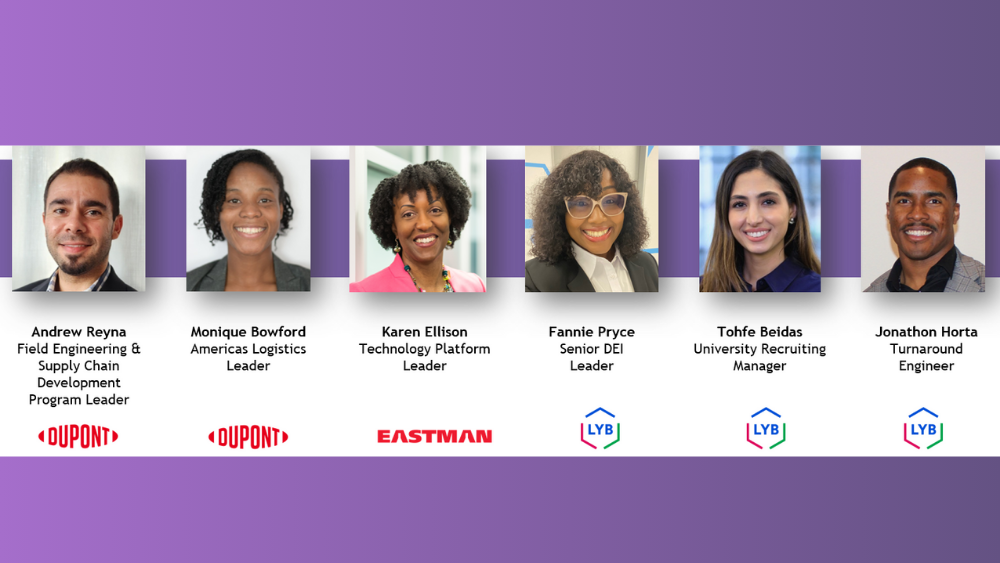This fall, the FOSSI Fundamentals of Success (FoS) turned its focus to the value of internships and co-ops in shaping future careers. Speakers included leaders from DuPont, Eastman, and LYB as well as scholars who have had jobs at FOSSI sponsor companies.
Panelists discuss the power of interning
DuPont’s Andrew Reyna led the discussion noting that “internships afford the opportunity to work along industry experts across the US and across the world. Most companies require graduating seniors to have industry experience and internships that boost your resume, which absolutely leads to full time job offers. Internships are also a great way to inform your long-term career goals and see how you can use your degree in the real world.”
“You get beyond book knowledge to the real application of things and get paid doing it,” contributed Eastman’s Karen Ellison. “When you get in a corporate environment you will see fairly quickly why understanding those engineering fundaments and key concepts and equations are so important. An internship gives you the perspective to appreciate the work you’re doing in school... Internships give you powerful stories to tell when you’re interviewing, and you can readily recite projects and accomplishments as a result of your experience.”
FOSSI scholars reflect on their internships
Four FOSSI scholars also shared insights on their internships, all agreeing that these experiences help you narrow down your interests and learn what you like and don’t like to do.
Rhythm Hairston said that her internships have helped her feel more comfortable networking and allowed her to apply her class learning to real life, remarking, “It helped me realize what I want to do and gave me the confidence to pursue it.”
Reflecting on his internships, Adam Bearden advised fellow scholars to network. “ Not only will you get to know the company, you will learn how to establish those social skills you can’t really learn in the classroom.” He continued, “Be intentional and make goals for yourself that keep you motivated to get your projects done.”
Not only will you get to know the company, you will learn how to establish those social skills you can’t really learn in the classroom.” He continued, “Be intentional and make goals for yourself that keep you motivated to get your projects done.”
Leah Wilson joined others in endorsing networking. “Through a strong relationship with an Eastman supervisor, I got the opportunity to speak at the AIChE Spring Meeting. Networking leads to opportunities! If you’re interested in learning about a different facet of the industry, just ask about it. I was in manufacturing but was interested in research and development, so I asked my supervisor and plant manager, and they set up meetings with people who worked in that area. Not only did I get to meet them and take tours, I got a project to work on.”
“My internship experience instilled me with a new sense of confidence,” remarked Jonathan Richards. “I learned how to network and even got to meet the CEO at Eastman, which was amazing. People are truly there to help you and to help you find your true self. I got so much support and can talk confidently about my experience at career fairs and in interviews.”
Co-ops
LYB panelists continued the discussion and presented scholars with a short tutorial on co-ops, telling them not to be intimidated. “Typically, co-ops require students to take one or more semesters off school and work full-time,” said Beidas. “Not only do you get to apply what you’ve learned in the classroom on the job, what you have learned makes so much more sense. And when you graduate, you can have 6–8 months of work experience which is a huge asset. You are working on real-world projects, your housing is paid, and you have a salary.”
In order to decide whether a co-op is right for you, Fannie Pryce advised, “The first step is to gather as much information as possible. Meet with your academic advisor to understand how this may impact your future courses and graduation. Dialogue with peers and industry mentors to understand the value of a co-op. Research the company, location, and role to ensure you make an informed decision. And when you’re ready, sign the offer!”
Jonathan Horta, a three-year LYB employee, talked about his experience as a former LYB co-op. Among the highlights he cited were working on real-world projects with full-time LYB employees and gaining relevant industry experience. “You become the expert on whatever task you’re given and are treated like a full-time employee. And don’t be nervous to ask questions. LYB is a company that values knowledge seekers and encourages learning.” Horta recommended that scholars “meet as many people as you can. You never know where or when you will run into people you have worked with in earlier jobs, and they can be helpful.”
We invite companies not currently supporting FOSSI to build their pipeline of outstanding and diverse talent by supporting a FOSSI scholar. Learn more.

